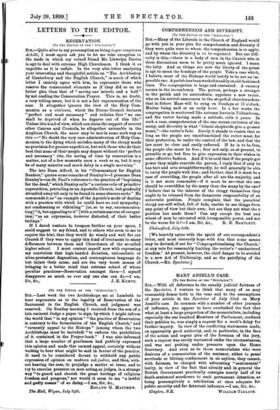COMPREHENSION AND DIVERSITY.
[To THE EDITOR OF THE "SPECTATOR:'] SIR,—Many of the Liberals in the Church of England would go with you in your plea for comprehension and diversity if they were quite sure to whom the comprehension is to apply, and by whom the diversity is to be regulated. But our diffi- culty is this,—there is a body of men in the Church who in these discussions seem to be pretty much ignored. I mean the laity. And as things are now the liberty of the priest is apt to mean the bondage of the people. Take a case which, I believe, most of the Bishops would testify to be not an im- possible one. A parish has been worked steadily on old-fashioned lines. The congregation is large and contented. A vacancy occurs in the incumbency. The patron, perhaps a stranger to the parish and its antecedents, appoints a new rector, who on his arrival announces to the stupefied churchwardens that in future Mass will be sung on Sundays at 11 o'clock, Matins being said at an early hour. In a few weeks the congregation is acatterred like autumn leaves in Vallombrosa, and the rector having made a solitude, calls it peace. In such a case, comprehension of the one means exclusion of the many, and diversity is what " liberal shepherds give a grosser name,"—the rector's fads. Surely it stands to reason that so long as the people are unenfranchised the rector must, for their protection, be under the control of the law, and that the law mast be clear and easily enforced. If he is to be free, the people also must be free ; free not only, as at present, to grumble or go, but free to give expression to their wishes in some effective fashion. And if it be said that if the people got power they might override the parson, I reply that if only he has tact and acts straightforwardly, he will generally be able to carry the people with him ; and farther, that if it must be a case of overriding, the people after all are the majority, and is it not more reasonable—if it must be so—that the one should be overridden by the many than the many by the one? I believe that in the interest of the clergy themselves they ought to be released from the dangerous responsibility of an autocratic position. People complain, that the parochial clergy are self-willed, full of fade, unable to see things from any point of view but their own; but are they not what the r position has made them ? Can any except the best and wisest of men be entrusted with irresponsible power, and not [We heartily agree with the spirit of our correspondent's letter, and most sincerely hope with him that some means may be devised, if not for " Congregationalising the Church," at any rate for reasonably limiting the rector's " unchartered freedom." At present, however, the chief danger to be avoided is a new Act of Uniformity, and so the petrifying of the Chun:h.—En. Spectator.]


































 Previous page
Previous page